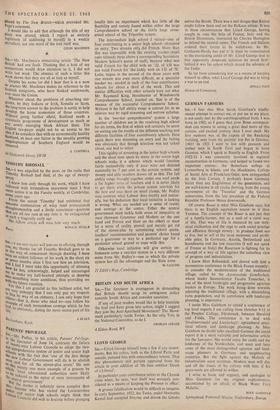GERMAN FARMERS
SIR,—I fear that Miss Sarah_ Gainham's kindly- meant attempt to correct me, or put me in my place, is not easily met by the autobiographical facts. I was born in 1902, so i guess that your Bonn correspon- dent can rejoice in seeing a great deal more of this curious and excited century than I ever shall. My first memory was of the cupola of the Reichstag building, seen from my parents' top flat in October, 19031 In 1921 I went to live with peasants and timber men in South Tirol and began to learn German, which I speak as fluently as English. From 1922-33 f was constantly involved in regional reconstruction in Germany, and helped to found two important centres: the Boberhaus college at Loewenberg in Silesia, and the Musikheim, College of Social Arts at Frankfurt/Oder, now extinguished by the Iron Curtain. I probably know Germany better than any Englishman of my generation, and am well-known in all circles deriving from the young movements of the 'Twenties' and the German universities, from the late president of the Federal Republic Professor Heuss downwards.
Of course Bauer is what Miss Gainham says, but there is no English equivalent nearer to it than Yeoman. The concept of the Bauer is not just that of a family-farmer, but as a unit of a rural way of life. That way of life is menaced by our tech- nical civilisation and the urge to seek social prestige and affluence through money: to produce food not to live, but to sell at the most economic and profit- able price. In Germany, Austria, Switzerland and Scandinavia and the low countries (1 will not speak of France or Italy) the Bauertum is fighting for its concept of a way of life against the suburban view of progress and industrialism.
I know Herr Rehwinkel, and shared with him a momentous conference in the Black Forest recently: to consider the modernisation of the traditional village, called by the Agrarsoziale Gesellschaft, whose leader Staatsrekretar Tassilo Troescher, is one of the most forthright and progressive agrarian leaders in Europe. The work being done towards adjusting the traditional village, with a diminishing farm population, and its correlation with landscape planning, is impressive.
I invite Miss Gainham to attend a conference of top level experts I am calling from October 9-12 at the Peoples' College, Fiirsteneck, between Hersfeld and Fulda. The conference is to deal with 'Strukturwandel and Landschafe: agricultural struc- tural reform and landscape planning. As Miss Gainham no doubt talks excellent German she could report it in a most valuable and informative article for the Spectator. She would enjoy the castle and the landscape of the Vorderchon, and meet and hear some of the most distinguished agrarian and land- scape planners in Germany and neighbouring countries. But the fight against the Moloch of industrialism must continue. Modern man will die, and all the traces of his culture with him, if his grass-roots are allowed to wither.
I write in haste and urgency, and apologise to Miss Gainham for my original explosiveness, accentuated by an attack of Black Water Fcrn Malaria.
ROLF GARDINER
Springhead, Fonttnell Magna, Shaftesbury, Dorset


































 Previous page
Previous page